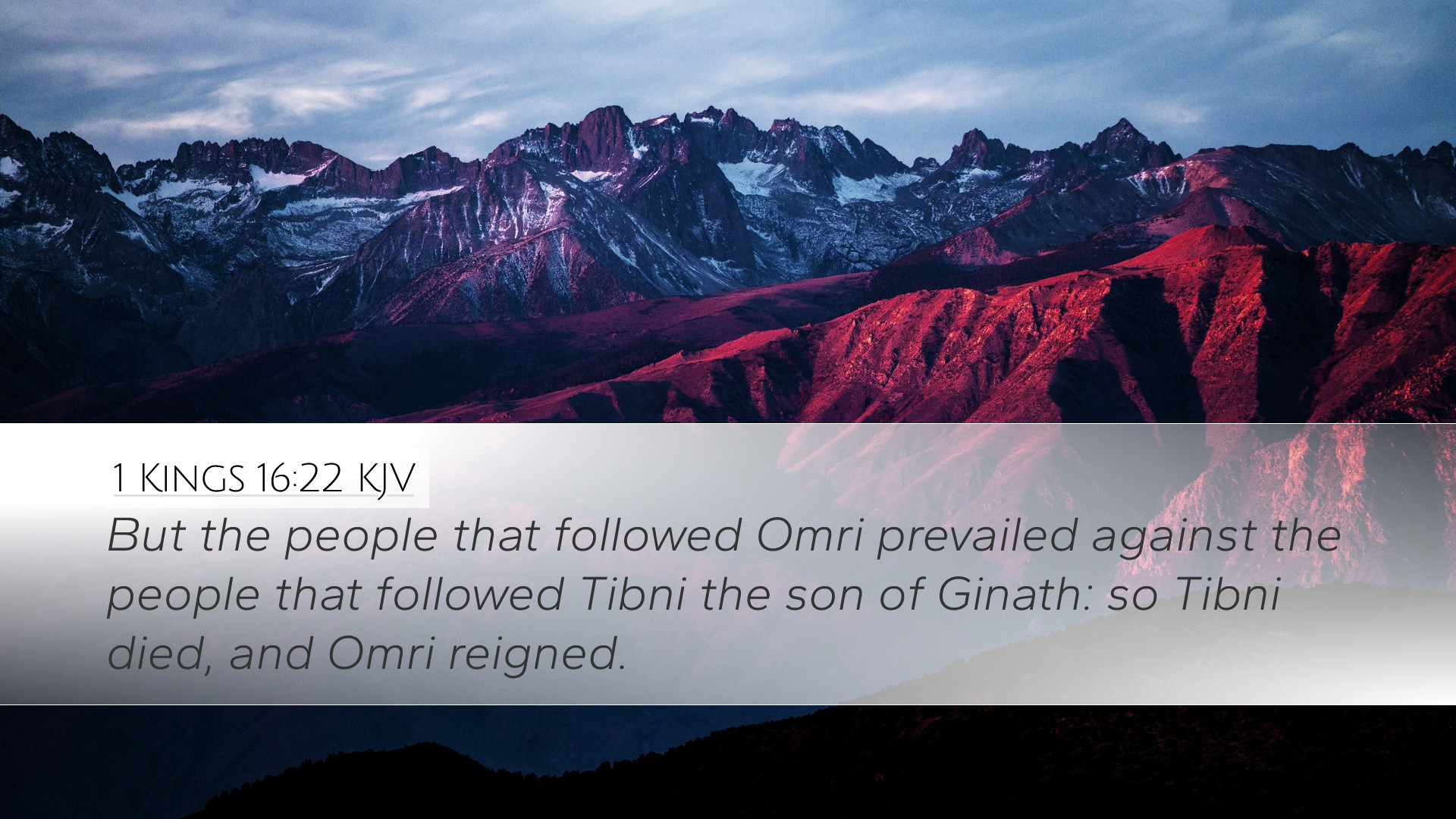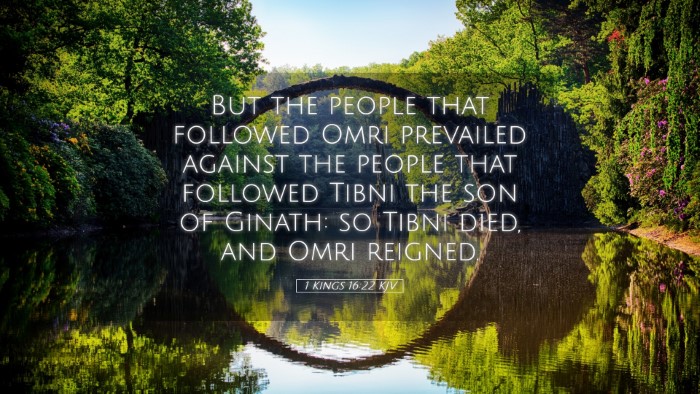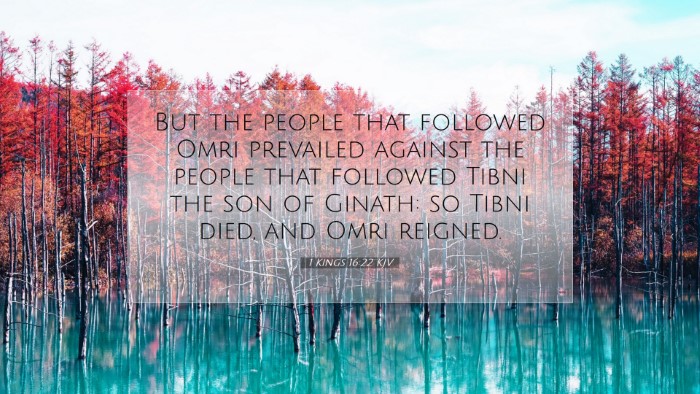Commentary on 1 Kings 16:22
Bible Verse: 1 Kings 16:22 (KJV) - “But the people that followed Zimri were divided among all the people: and half of the people followed Tibni the son of Ginath, to make him king; and half followed Omri.”
Introduction
This verse presents a pivotal moment in the history of Israel during the divided monarchy. It reflects the political strife and fragmentation among the people as they navigate competing claims to the throne. The significance of leadership, the essence of loyalty, and the nature of civil discord resonate throughout this passage.
Historical Context
The period described in 1 Kings 16 follows a series of tumultuous events that led to the deaths of kings and usurpations of power. Zimri’s brief reign, characterized by treachery against his predecessor Elah, sets the stage for the conflict outlined in verse 22.
Historically, Zimri is known for his drastic actions that ultimately led to his downfall. The division of the people into factions demonstrates the instability within the northern kingdom of Israel, displaying how desperation for leadership can create clashing allegiances.
Divided Allegiances
Matthew Henry's Commentary: Henry emphasizes the significance of the divisions among the people, noting that divisions often reflect deeper societal discontent. The choice between Zimri, Tibni, and Omri indicates a populace torn not just by the desire for power but also by a sense of national identity and direction.
Albert Barnes adds: “The people’s division was not merely political but also a reflection of their spiritual state.” He suggests that the chaos within Israel was a direct consequence of straying from God’s commands. The people’s willingness to follow different leaders signifies a lack of unity and common purpose, which ultimately undermines the kingdom’s stability.
The Dangers of Factionalism
Factionalism can lead to significant consequences for a nation. Adam Clarke notes that these divisions hindered the effectiveness of governance and solidified a culture of rivalry among the leaders. Each faction's loyalty can be seen as a microcosm of Israel's larger spiritual struggles, where allegiance to God and His chosen leaders became compromised.
This fragmentation demonstrates how civil strife can eclipse common interests and values. The conflict illustrates a deeper moral failing, as the people sought human authority rather than divine guidance, which provides an important lesson for modern-day believers about the dangers of political idolatry.
The Role of Leadership
Leadership in Israel during this time was complex and filled with challenges. The internal strife outlined in this verse showcases the necessity of wise and godly leadership.
Matthew Henry notes: “A good leader must unite the people rather than divide them.” The value of unity under Godly principles is essential for the health of any community. The text serves as a reminder of the need for leaders who can bridge divides rather than exacerbate them.
Albert Barnes elaborates: “Omri’s eventual success in overthrowing Zimri showcases the necessity for a strong and decisive leader.” Omri’s rise to power, although controversial, was marked by his ability to secure allegiance and stability amidst chaos.
Spiritual Implications
Beyond the immediate political implications, 1 Kings 16:22 invites deeper theological reflection. Factionalism and divided allegiances within the church today can often mirror the disunity seen in Israel. Adam Clarke points to this verse as an exhortation for believers to seek unity in Christ, rather than allowing external pressures to divide the body of Christ.
This disunity within the people of Israel serves as a cautionary tale for contemporary believers to remain steadfast in their allegiance to God rather than being swayed by external political or social pressures.
The Importance of Choice
The choice facing the people of Israel in this passage reflects broader human struggles with choice and allegiance. In spiritual matters, believers are continually faced with the choice of whom to follow. The divided factions of Tibni and Omri serve as a metaphor for the choices we must make in various aspects of life.
Matthew Henry suggests: “Choosing the right leader is akin to choosing a path of righteousness.” For Christians, this reminds them to evaluate their choices carefully and consider who they follow, both in leadership and in faith.
Albert Barnes reflects: “Both factions thought they had a valid claim; wisdom is in recognizing the true leader appointed by God.” This highlights the need for spiritual discernment in choosing leaders who align with God’s will.
Conclusion
1 Kings 16:22 serves as a poignant reminder of the complexities of leadership and the importance of unity among God’s people. As pastors, students, and scholars engage with this text, they are encouraged to reflect on the spiritual dynamics at play during this tumultuous time in Israel's history.
This commentary calls for modern believers to examine their own allegiances and the leaders they choose to follow, reminding us that true leadership prioritizes unity grounded in God’s truth, rather than human ambition.


